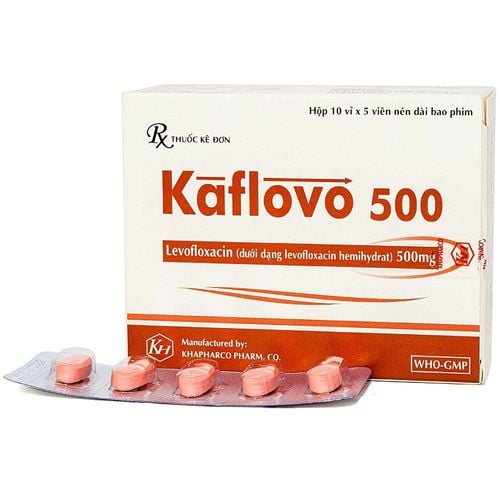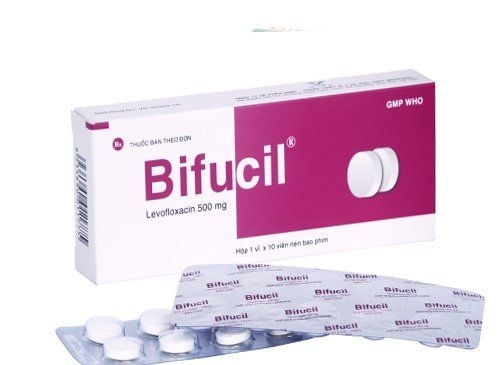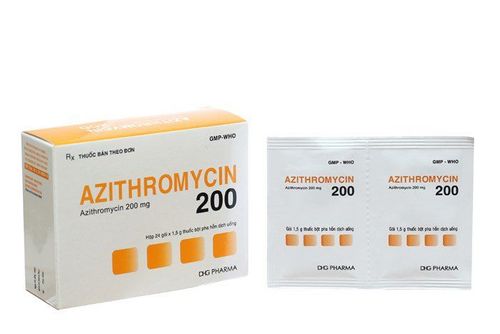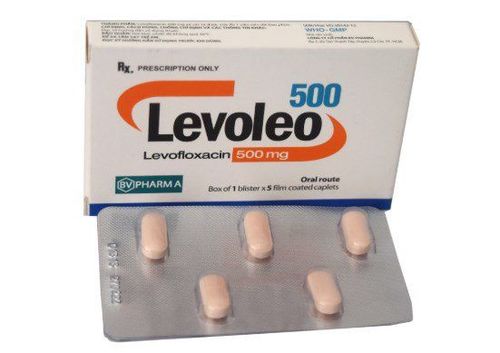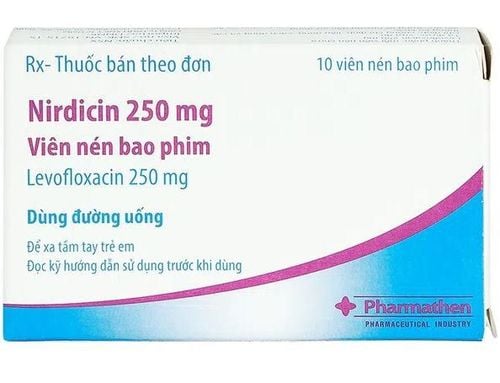This is an automatically translated article.
Voledex has the main active ingredient Levofloxacin, a fluoroquinolone antibiotic with a broad spectrum of antibacterial activity against many strains of Gram-negative and Gram-positive bacteria. The drug is indicated in the treatment of infections caused by susceptible bacteria.1. What does Voledex do?
Voledex drug contains the active ingredient Levofloxacin, a synthetic antibiotic belonging to the fluoroquinolone group. Levofloxacin's mechanism of action is to inhibit topoisomerase II and/or topoisomerase IV, essential enzymes involved in bacterial DNA replication. Levofloxacin is a broad-spectrum antibiotic that is active against many strains of Gram-negative and Gram-positive bacteria. Levofloxacin is more effective against Gram-positive bacteria and anaerobes than other fluoroquinolone antibiotics such as Ciprofloxacin, Norfloxacin, Ofloxacin. However, the efficacy of Levofloxacin against Pseudomonas aeruginosa is weaker than that of Ciprofloxacin. Voledex is indicated in the treatment of infections caused by susceptible bacteria including:
Acute sinusitis. Acute exacerbation of chronic bronchitis. Community-acquired pneumonia. Prostatitis. Urinary tract infections with or without complications. Skin and subcutaneous tissue infections. Prophylaxis after exposure or treatment of anthrax. Voledex is contraindicated in patients with a history of hypersensitivity to Levofloxacin, other quinolone antibiotics or to any of the ingredients listed in the formulation. In addition, the drug is also not used for patients with epilepsy, G6PD enzyme deficiency, a history of tendon disease caused by fluoroquinolone antibiotics and children under 18 years of age.
2. What are the side effects of Voledex?
Patients using Voledex may experience the following side effects:
Common:
Gastrointestinal: Nausea, vomiting, abdominal pain and diarrhea. Liver: Increased liver enzymes. Nervous: Insomnia and headache. Uncommon:
Nervousness: Dizziness, dizziness, nervousness, agitation and anxiety. Cardiovascular: Chest pain, edema. Respiratory: Difficulty breathing. Gastrointestinal: Abdominal pain, flatulence, dyspepsia, vomiting and constipation. Liver: Hyperbilirubinemia. Urogenital: Genital candidiasis and vaginitis. Skin: Itching, and rash. Rare:
Cardiovascular: Raise/lower blood pressure and arrhythmia. Gastrointestinal: Pseudomembranous colitis, gastritis, tongue edema, dry mouth, anorexia and esophagitis. Musculoskeletal: Arthralgia, myalgia, bone pain, tremor, osteomyelitis, Achilles tendonitis. Neurological: Convulsions, abnormal dreams, depression, anxiety, confusion, somnolence, hallucinations, hypertonia and psychosis. Hematology: Anemia, leukopenia, thrombocytopenia. Allergies: Quincke's edema, anaphylaxis, Stevens-Johnson syndrome and Lyell syndrome.
3. Dosage of the drug Voledex
Dosage of Voledex varies depending on the severity of the infection and the patient's overall health. Below is a reference dose of Voledex in some cases:
Respiratory infections:
Acute exacerbation of chronic bronchitis : The recommended dose is 500mg, once a day for 7 days. Community Acquired Pneumonia: The recommended dose is 500mg, 1-2 times a day, for 7-14 days Acute maxillary sinusitis: The recommended dose is 500mg, once a day, for 10-14 days Infections Skin and subcutaneous tissue:
In case of complications: The recommended dose is 750mg, once a day, for 7-14 days. Uncomplicated cases: The recommended dose is 500mg, once a day, for 7-10 days. Urinary-genital infections:
Complicated: The recommended dose is 250mg, once a day, for 10 days. Uncomplicated: The recommended dose is 250mg once daily for 3 days. Acute pyelonephritis : The recommended dose is 250 mg once daily for 10 days. Prostatitis: The recommended dose is 500mg, once a day. Patients with renal impairment: The dose of Voledex should be adjusted according to the patient's glomerular filtration rate.
Patients with hepatic impairment : No dose adjustment of Voledex is required in patients with hepatic impairment
4. Notes when using the drug Voledex
Patients taking quinolone antibiotics are at risk of tendonitis, especially the Achilles tendon, which can lead to tendon rupture. This complication can appear in the first 48 hours after taking the drug and can be bilateral. Tendonitis occurs mainly in high-risk subjects such as the elderly, people who are taking corticosteroids (including inhalation). Levofloxacin, like other quinolone antibiotics, can cause cartilage degeneration in load-bearing joints, so Voledex should not be used in children under 18 years of age. Voledex should be used with caution in patients with myasthenia gravis because symptoms may be aggravated. Central Nervous System Effects: There have been reports of adverse reactions such as psychosis, increased intracranial pressure, CNS excitability leading to convulsions, restlessness, headache, tremor, insomnia, depression, confusion, nightmares, suicidal ideation or action with quinolone antibiotics, even at the first dose. If these adverse reactions occur while using Voledex, the patient should discontinue the drug and take appropriate measures. Care should be taken when using Voledex for patients with central nervous system diseases such as epilepsy, cerebral vascular sclerosis, etc., because it may increase the risk of convulsions. Hypersensitivity reactions with various clinical manifestations, even anaphylaxis, have been reported in patients receiving levofloxacin. Voledex should be discontinued immediately upon signs of hypersensitivity reactions and appropriate therapeutic measures instituted. Clostridium difficile pseudomembranous colitis has occurred with the use of levofloxacin. many cases can be very serious and life-threatening. Sensitization to photos has occurred with the use of fluoroquinolone antibiotics, including Levofloxacin. Therefore, patients should avoid direct exposure to light during treatment and 48 hours after taking the drug. Levofloxacin may cause disturbances in blood glucose metabolism, including hyperglycemia and hypoglycemia, especially in patients with diabetes mellitus. Therefore, close blood glucose monitoring is required in patients receiving Voledex. The use of Levofloxacin may cause prolongation of the QT interval on the electrocardiogram in some patients, therefore it should be avoided in patients with pre-existing QT prolongation, hypokalemia, and taking anti-inflammatory drugs. class IA or class III arrhythmias. Pregnancy: Levofloxacin crosses the placenta and can be detected in amniotic fluid. Voledex should only be used during pregnancy when the benefits outweigh the risks. Lactation: Levofloxacin may be excreted in breast milk. Because the drug has a risk of causing cartilage damage in young children, Voledex should not be used in nursing women.
5. Drug interactions
Concomitant use of Voledex with some drugs may cause interactions, leading to decreased therapeutic efficacy or increased side effects. It is best for the patient to inform the medical staff of all prescription drugs, nonprescription drugs, dietary supplements and vitamins that are being used for advice. The following are some interactions to be aware of when using Voledex:
Concomitant use of antacids, sucralfate, metal ions and multivitamins can reduce the absorption of Levofloxacin. Therefore, these drugs should be taken at least 2 hours away from Voledex. Theophylline: Concomitant use with Levofloxacin may increase theophylline concentration. Therefore, it is necessary to closely monitor theophylline concentration and adjust the dose if necessary when using these two drugs simultaneously. Warfarin: Use with Levofloxacin may increase the effect of Warfarin. Coagulation parameters should be monitored when these two drugs are used concurrently. Nonsteroidal anti-inflammatory drugs may increase the risk of CNS irritation and convulsions when used concomitantly with Voledex. Concomitant use of hypoglycemic agents with levofloxacin may increase the risk of dysglycemia, so the patient's blood glucose should be closely monitored. The article has provided information about the uses, dosage and notes when using Voledex. The information above is for reference only and cannot replace guidance from medical personnel. Patients should consult their doctor or pharmacist before using the drug.




